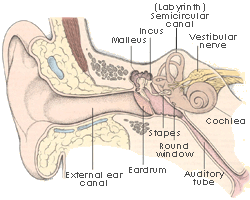| |
 |
| Picture of ear anatomy |
 |
Eardrum, malleus, incus and stapes are hearing organs. |
 |
Semicircular canal (labyrinth), vestibular nerve and cochlea are balancing organs. |
|
| (Stedmans's Medical Dictionary 27th edition copyright 1999) |
Ménière's disease is a disease of the inner ear. Build-up of fluid in the inner ear creates excess pressure and causes damage to the sense organs that are responsible for balance and hearing. A patient with Ménière's disease typically presents with varying levels of hearing loss, a sense of fullness in the ears, tinnitus and episodes of vertigo.
The disorder is also known as endolymphatic hydrops. The cause is unknown, but it is a common ear, nose and throat (ENT) disease. The major clinical symptoms are frequent attacks of vertigo, tinnitus, degrees of hearing loss and a sensation of fullness in the inner ear. Symptoms will resolve with or without treatment. The disease is usually seen in the young and middle-aged adults, and approximately 75 per cent of cases occur in those aged 30 to 60 years. The incidence between the sexes is equal. A recent increase in the number of cases is probably related to the increasing risk of air pollution and chemical toxicity.
|
|
| |
 |
| TCM would classify Ménière's as a "dizziness" disease |
Ménière's disease is a disorder of the fluid-filled semicircular canals of the inner ear (labyrinth).
Traditional Chinese medicine (TCM) practitioners focus on the dizziness that results from the disease and consider it to be ear related. The disorder is therefore categorized as "aural dizziness." Dizziness is a sensation of unsteadiness with a feeling of movement within the head. It is also referred to as giddiness or vertigo and there is often blurring of vision. In mild cases, the symptoms disappear when the eyes are closed. In serious cases, patients experience a whirling sensation and the feeling that things about them are turning. There is also then a tendency to loose balance and fall; this is commonly accompanied by nausea, vomiting and sweating.
Different TCM schools through the ages have varied in their theories on the etiology of this disease. The famous classic Huang Di Nei Jing (The Yellow Emperor's Medicine Classic) held that "Dizziness with trembling extremities is a syndrome caused by the stirring of liver-wind inside the body. It is also related to qi deficiency and deficit in the sea of marrow, etc."
|
| |
|